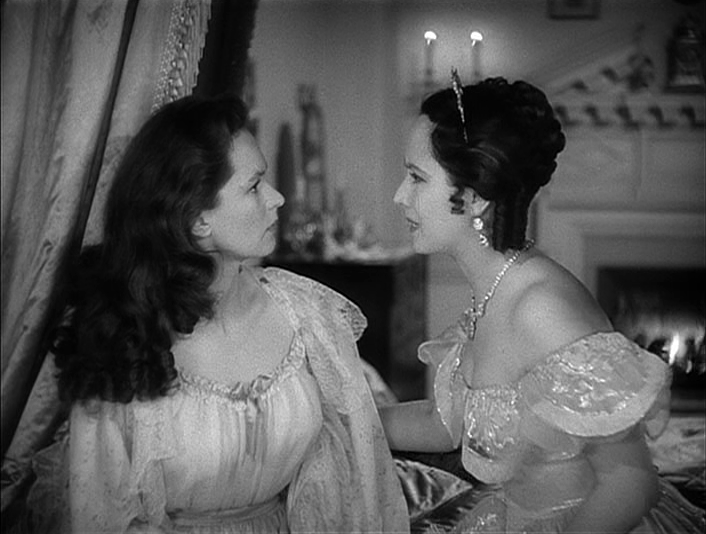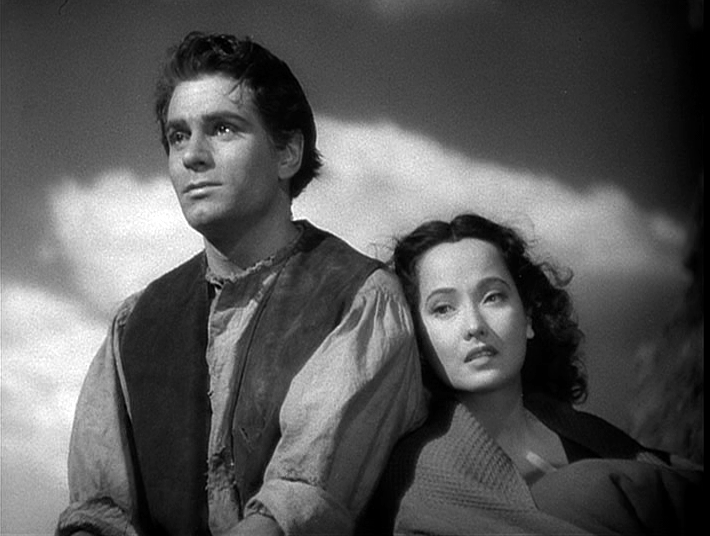Wuthering Heights, 1939, United Artists. Starring Merle Oberon, Laurence Olivier, David Niven. Directed by William Wyler. B&W, 104 minutes.
A passionate tale of ill-fated love, Wuthering Heights takes a deep look into the hearts and motivations of Cathy (Merle Oberon) and Heathcliff (Laurence Olivier) as they move through their lives with and without each other.
Young Cathy’s father returns home to his son and daughter with a forlorn and rebellious waif, Heathcliff. While Cathy initially despises the unfortunate youth, the two eventually become close friends, and as they grow into young adulthood they fall in love.
Yet despite their feelings for each other, Cathy wants a different life than she believes Heathcliff can offer her, and she marries Edgar Linton (David Niven). Heathcliff’s response to her rejection, and the actions that follow, set a tragic path for the young lovers.

David Niven, Merle Oberon
The relationships in this film are complex, and not just that between Cathy and Heathcliff. The interactions of Heathcliff with Cathy’s brother Hindley (Hugh Williams) and Linton’s sister Isabella (Geraldine Fitzgerald) and the way he uses them in his quest to win Cathy’s love are pivotal to the story.
Wuthering Heights was nominated for eight Academy Awards, including Best Picture, Best Director, Best Actor and Best Screenplay, and won for Best Cinematography, Black & White. As 1939 is considered by many to have been the finest year for films during the Golden Age of Hollywood, the number of nominations Wuthering Heights received is notable.

Geraldine Fitzgerald, Merle Oberon
As is the cinematography. In contrast to the popular style of the day, the imagery is sharp, with high contrast and lighting that enhances the moodiness of the story. It was cinematographer Gregg Toland’s third movie with director William Wyler, and he would go on to work with him on three more films, including The Best Years of Our Lives, also noteworthy for its cinematography.
This was the movie that launched Olivier’s film career. After pronounced failure on Queen Christina several years before, he had returned to the stage in London, where he experienced great success and expected to live out his career. He had a hard time adjusting to work on a movie set, and years later credited Wyler for setting him in the right direction and instilling in him an appreciation for the art of film acting.

Laurence Olivier, Merle Oberon
The ending, with the ghosts of Heathcliff and Cathy, was producer Samuel Goldwyn’s idea, and something Wyler refused to take part in. Goldwyn hired another director and stand-ins for Oberon and Olivier to complete the scene.
Wuthering Heights set a standard as a film depicting deep passions and ill-fated love. It maintains its intensity today, and holds its own against later adaptions of Emily Brontë’s phenomenal book.

You know, I read the book but never watched the movie. Heresy!
LikeLiked by 1 person
The movie only covers half of the book, but it’s still good!
LikeLiked by 1 person
I’m glad to hear that the stupid ghosts were an add-on. Considering how intense, almost violent, they are in the book…
LikeLiked by 1 person
That was a large part of why Wyler wouldn’t do it. He felt the ghosts were untrue to the story, and compromised his telling of it.
LikeLiked by 1 person
Play every and all wuthering Heights find discovery THE greatness in all the various aspects of
LikeLike